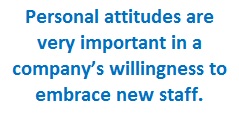Let the business community explain
what is really necessary for career success
by Robert Parkinson
Recent weeks have shown us what a difference a day makes. After the so-called ‘Black-Monday’ several major companies that usually hire graduates in their thousands every season have frozen graduate recruitment entirely. My guess is that it will restart soon when people stop panicking. This raises the subject of the annual student rush to find jobs. In my view, the business community needs to change and reinforce the correct message to young people about what is really required to do well in the early years of a career.
 My contention, particularly having more closely researched the elements of education that China values, is that there is far too much emphasis on competing for prized university places; frivolous expenditure on overseas higher-education, and confusing social–advancement with the need to start at the beginning and do, as the law firms call it, the ‘grunt work’.
My contention, particularly having more closely researched the elements of education that China values, is that there is far too much emphasis on competing for prized university places; frivolous expenditure on overseas higher-education, and confusing social–advancement with the need to start at the beginning and do, as the law firms call it, the ‘grunt work’.
Let me start by looking at educational background and its importance. It is certainly true that those students who work the hardest or are the luckiest in the gene-pool lottery stand to win places at the likes of Renmin University, Peking University or Jiatong University – the Oxbridges of the Orient. It is also true that statistically it is likely that students from these universities will go on to achieve acclaim in many walks of life, some in business, the law, engineering, academia, and perhaps medicine (although, bizarrely, medicine in China is not seen as prestigious as it is in the West). However, we are specifically addressing the business community here: companies. So let us focus on this section of students and analyse the importance of educational background on their early job chances.
In my 10 years in China, I have interviewed hundreds of graduates. Some are from the very best universities, some not. A characteristic of those from particularly good universities I have noticed is that many of these youngsters seemed to struggle to escape from ‘education-mode’. They look at life through the lens of academia, whereas it is necessary to understand situations in their context: circumstance; colleagues; availability of resources and most importantly the effect on others. This is something I have found people who have been over-educated, particularly in the sciences, to be spectacularly affected by: they suffer from over-analysis-paralysis.
 Another difficulty found in those who have been to the best Chinese universities, but also those who have an overseas master’s degree, has been an unwillingness to start at the bottom. This means the banal, mind-numbing, coffee-making boring work that we are all glad to stop doing. In fact - so often reading the biographies of very successful business people you discover that they started life in the post-room, as a tea-boy or ‘runner’. This starting point is important because it makes the young appreciate the next opportunity much more. It is also my opinion that personal attitudes are very important in a company’s willingness to embrace new staff; and a lack of willingness to start at the bottom smacks of arrogance, an unattractive and therefore handicapping quality.
Another difficulty found in those who have been to the best Chinese universities, but also those who have an overseas master’s degree, has been an unwillingness to start at the bottom. This means the banal, mind-numbing, coffee-making boring work that we are all glad to stop doing. In fact - so often reading the biographies of very successful business people you discover that they started life in the post-room, as a tea-boy or ‘runner’. This starting point is important because it makes the young appreciate the next opportunity much more. It is also my opinion that personal attitudes are very important in a company’s willingness to embrace new staff; and a lack of willingness to start at the bottom smacks of arrogance, an unattractive and therefore handicapping quality.
Interviewing students who have studied overseas, one of the first questions I put is who their friends were. I am looking to find out if they embraced the wider community around them, or if they remained isolated in their own national peer group. Those who integrated in the community were, in my experience, far more successful. I remember a very successful lady who used to work with me explaining with great affection how one of the most formative elements of her UK study time was evening / weekend work in a fish-and-chip shop. She said it taught her the most about how British people are and how to treat customers. By the same token, those families who choose to send their children overseas just because they have the wealth to do so are doing their children anything but a service. It is rather like telling your child that it’s a good idea to buy an expensive watch, just because you have the wealth to do so, when in fact it does very little for you. My point here is that time spent studying overseas, if simply a representation of wealth, gives the child the idea that this is a good thing, when, in my view it is the polar opposite.
So far I have highlighted some of the weaknesses of relying solely on education as a means to your first job. I would now like to put forward some suggestions how students might get ahead in the career queue and give themselves the very best chances when starting out. These suggestions might also be useful to those responsible for hiring youngsters who may be products of the same system.
First, 20 years ago when I was in my late teens I was casual about work experience. This is now of paramount important and called an internship. In my view this is at least as important, if not far more important, as educational background for a career in business, and many other fields. In my own HR consultancy I have interviewed many people for internship positions. The range varies hugely between those who have one or at most two internships to people who have as many as ten or more sets of experience. This, in my view, is one of the single most important ways a student can give themselves a boost at the start of their career. Ten successful internships may have the effect of compressing 5 years of full-time work into a matter of months. Exhausting: yes, valuable - extremely. Note as well my use of the words ‘successful internships’. Some students do as little as possible in their time with a host company. They see it as a chore, a box to tick for their schools. Others work as hard as they possibly can, safe in the knowledge that, if they don’t like it, it will only be for a short time. Very often they do like it.
 One element of interning that some people miss entirely is that during this time the students are likely to be exposed to many people, some quite senior. What the smart remember and the lazy forget is that if these contacts are impressed the intern may have already be given a job offer so they don’t have to join the graduate queue. Even if they are not offered a position, only very unfair companies would not give a solid reference, which in turn provides an entry ticket to the next opportunity, perhaps another internship or a permanent job. In addition to this, people should remember that most jobs at entry level or for the experienced are un-advertised and often are awarded through contacts. The graduate recruiters are really only herding cattle with very blunt instruments.
One element of interning that some people miss entirely is that during this time the students are likely to be exposed to many people, some quite senior. What the smart remember and the lazy forget is that if these contacts are impressed the intern may have already be given a job offer so they don’t have to join the graduate queue. Even if they are not offered a position, only very unfair companies would not give a solid reference, which in turn provides an entry ticket to the next opportunity, perhaps another internship or a permanent job. In addition to this, people should remember that most jobs at entry level or for the experienced are un-advertised and often are awarded through contacts. The graduate recruiters are really only herding cattle with very blunt instruments.
Of course all of this might seem obvious to some, but to most, maybe not. In England we talk of people not being able to see past the end of their noses. The message to young people is that ‘nothing beats experience’ nor a hard-working attitude, which ample pre-work experience will give you. In just the same way as you can’t buy good fortune, you can’t buy your way in to the world of work through an overseas degree. My advice to those in the hiring community is to stop asking about grades and start asking about experience and behaviour. These are the elements that will make our youth successful; they will also make our companies successful.
--- END ---